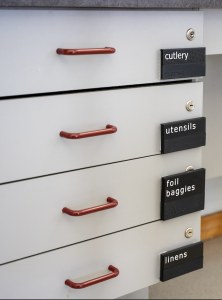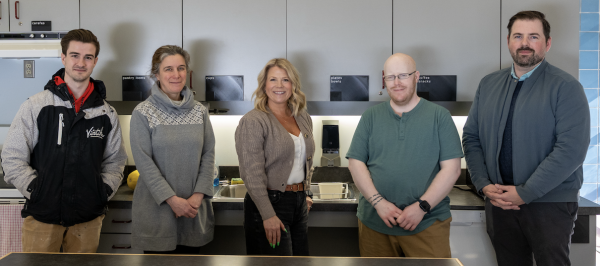 Confederation College’s Applied Research and Innovation team collaborated to develop an innovative 3D-printed Braille signage solution for individuals with vision loss. This initiative, conducted in partnership with the Canadian National Institute for the Blind (CNIB) and Vision Loss Rehabilitation Canada (VLRC), aims to improve accessibility within a kitchen environment used for rehabilitation and skill development.
Confederation College’s Applied Research and Innovation team collaborated to develop an innovative 3D-printed Braille signage solution for individuals with vision loss. This initiative, conducted in partnership with the Canadian National Institute for the Blind (CNIB) and Vision Loss Rehabilitation Canada (VLRC), aims to improve accessibility within a kitchen environment used for rehabilitation and skill development.
The project originated from a need for improved signage at CNIB’s practice kitchen in Thunder Bay, where individuals with vision loss can learn or relearn to navigate cooking environments. The facility previously relied on paper Braille signage, which was not durable enough for long-term use. The College’s Advanced Manufacturing team, led by Research Supervisor Greg Gagnon, saw an opportunity to create an effective and lasting solution.
The team faced a unique challenge in developing signage that was both tactile and readable. Traditional 3D printing methods often produce sharp edges that are not suitable for Braille users. To address this, they employed a dual-process 3D printing method that created smooth, raised, large print text alongside Braille.
“The development of this signage required us to rethink conventional techniques,” said Greg Gagnon, Research Supervisor at Confederation College. “Using two different processes, we were able to ensure that the signs are both cost-effective and optimized for accessibility.”
The final product consists of durable 3D-printed squares that combine raised text and Braille, designed to be readable by touch while remaining easy to install and maintain. The materials and methods were selected to keep costs low, ensuring affordability for organizations and end users.
CNIB played a crucial role in verifying the effectiveness of the signage, with a Braille reader assessing the prototypes before installation. The enhanced signage is anticipated to greatly improve the experience of individuals learning to navigate kitchen environments, offering them clear and tactile guidance.
“Accessibility means removing obstacles, and initiatives like this have a significant impact,” said Tanis Boardman, Manager, Ontario Programs and Community Engagement, CNIB. “We are excited to collaborate with the College on this project, which will assist individuals with vision loss in Thunder Bay and raise community awareness about accessible signage.”
Confederation College’s Applied Research and Innovation office collaborates with educational institutions, government entities, industry experts, entrepreneurs, and community interest-holders to tackle practical challenges across the region. Through participation in applied research and development projects, the college promotes community and economic growth, enhances its educational programs, enriches student learning experiences, and supports the professional development of faculty and staff. This collaborative approach ensures that research activities, including social innovation and action research, yield measurable and immediate social or economic benefits.
- Split the Pot Lottery “Marches Into Gold” - March 2, 2026
- New leaders take helm of United Steelworkers union - March 2, 2026
- Celebrate Les Rendez-vous de la Francophonie from now until March 31! - March 1, 2026
 Wawa-news.com Local and Regional News
Wawa-news.com Local and Regional News


